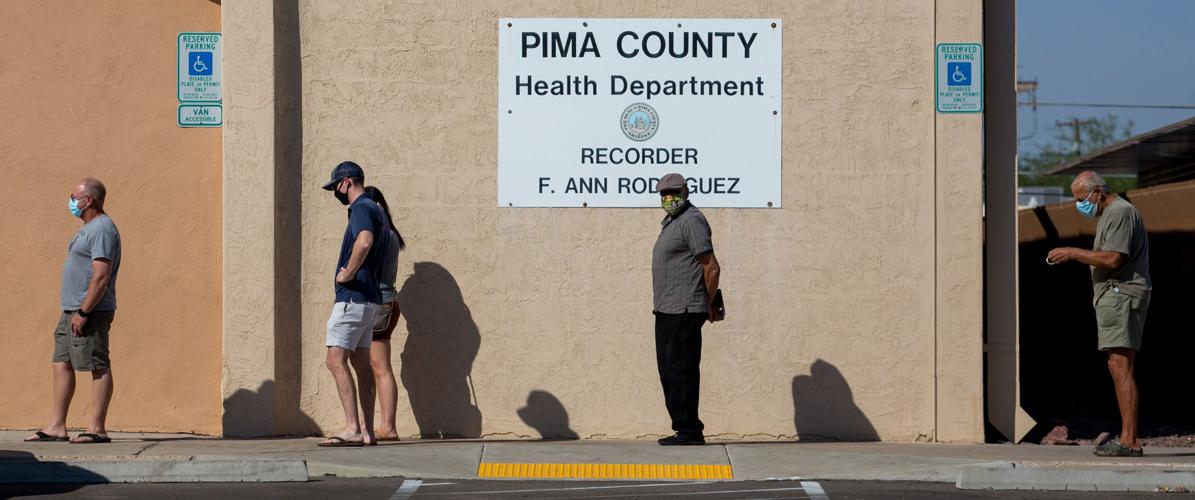When I went to vote Tuesday, a Tucson police officer was standing at the entry to the Pima County Recorder’s Office on East Broadway.
I said hello, he greeted me back, and that was the extent of our interaction as I passed into the breezeway.
Honestly, I was happy to see him there — not because anything bad was going on, but in case anything untoward developed — and potentially to deter it. In these polarized times, with so much concern and anger about the election, bad things can happen around polling places. And poll workers aren’t necessarily well-equipped for whatever happens.
So it surprised me Thursday when I learned the mayor, police chief and city manager had barred Tucson officers from working off-duty shifts at polling places in favor of stationing more patrol officers nearby. Pima County Recorder F. Ann Rodriguez had hired the officers at voting sites around the county.
The reason the mayor’s office gave was that it had received complaints that the presence of uniformed officers amounted to voter intimidation. It cited a letter from a coalition of voting-rights groups asking that police be removed.
“Many people, especially those belonging to historically marginalized communities, find the presence of police officers at polling locations intimidating,” the letter says. “Moreover, if police presence is excessive and/or not necessary to address a genuine security or safety issue, it can rise to the level of voter intimidation, and could violate state and federal law.”
My first reaction: Give me a break — those officers do more good than any harm they theoretically cause. And I questioned — I still do question, actually — how many people really feel intimidated by police officers standing outside polling places.
But on further consideration — maybe I was wrong at first. Not for the reason the voting-rights groups cited but because political activity is not allowed within 75 feet of the entrance of a polling place. And in this election, many rank-and-file police have made themselves part of a partisan front.
The Tucson Police Officers Association is one of numerous police unions and organizations in the country that have endorsed Donald Trump for president. TPOA did so as part of the Combined Law Enforcement Associations of Arizona and the Arizona Police Association, which presented their endorsement to Vice President Mike Pence in Tucson on Aug. 11.
Justin Harris, president of the Arizona Police Association and a Glendale officer, explained the endorsement this way during Pence’s visit:
“These liberal socialist elected officials have essentially told their constituents that law and order is no longer a priority. Essentially, folks, they’re letting the inmates run the asylum.”
On a bigger scale, the national Fraternal Order of Police has also endorsed Trump, as has the National Association of Police Organizations.
Their desire for “law and order” apparently applies only to people in the streets, not in the White House.
When in the first presidential debate, Trump needled Biden for not having any police union support, he was right. Many police chiefs or executives may support Biden, but the rank and file is by and large with Trump.
That makes some sense given Trump’s constant efforts to court law enforcement officers and uphold them as tough guys keeping criminals and radicals in check.
In 2017, at a police conference on Long Island, N.Y., Trump infamously encouraged officers to rough up arrestees, saying, “Please don’t be too nice.” The officers present laughed, but police chiefs around the country warned their officers not to take Trump seriously.
When protests and riots broke out over police violence this summer, Trump sent a clear message to the rank-and-file cops that he is on their side, no matter what they do. In September, he referred to police throwing aside protesters and reporters, and shooting a rubber bullet into a MSNBC reporter’s knee as “a beautiful sight.”
The support appears even more avid in the law enforcement agencies of the Department of Homeland Security, which has turned into an unofficial arm of the Trump campaign. The National Border Patrol Council and National ICE Council have supported Trump since early in his 2016 campaign, and agency administrators have turned their social-media accounts into pro-Trump propaganda efforts.
ICE has even taken out six billboards showing “criminal aliens” wanted for various crimes and saying “Sanctuary policies are a real danger.” They happen to be placed in Pennsylvania, one of the critical states in this year’s presidential election.
These efforts by federal agencies are out of bounds — using taxpayer money to advocate for the president — but of course, the line officers and their unions are free to endorse whoever they want. It’s their right.
The thing is, when you advocate for a political candidate or position, you lose any public perception of neutrality you may have. Take it from me — I know, having lost some readers for my persistent anti-Trumpism and other opinions.
That’s OK. It’s a cost of taking a political stand. In this case, the cost also happens to include some lost overtime for Tucson officers who were working these shifts off duty.
On Twitter, Police Chief Chris Magnus reassured the public: “Just to be clear, we will have ample officers checking on & patrolling around polling places. This is not an ‘either-or’ situation.”
Now, not every police association has endorsed Trump, or any presidential candidate. The Pima County Deputy Sheriffs Association, for example, has chosen not to make an endorsement. They don’t see an upside to it — a smart choice.
Coincidentally, on Friday, the Pima County Recorder’s Office announced that sheriff’s deputies will replace the Tucson officers at polling sites in the city.
That’s an unintentionally elegant solution to my concerns: Removing the declared partisans in uniform from within the 75-foot limit.
It doesn’t address the concerns of people who may feel intimidated by the mere sight of uniformed police, but at least these are not officers in the self-declared police front for Trump.





